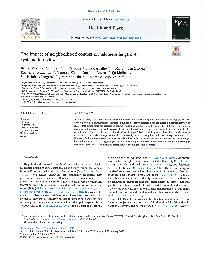The impact of neighborhood context on telomere length : A systematic review
A growing body of research demonstrates the association between neighborhood context and health. The underlying biological mechanisms of this association are not fully understood. We conducted a systematic review of studies that investigated the association between neighborhood context and telomere length (TL), a DNA-protein complex that shortens after cell division. Short TL is linked to age-related diseases and may be impacted by chronic stress. Nineteen eligible articles identified through PubMed and Scopus met inclusion criteria. Results demonstrated inconsistent support for the relationship between neighborhood disadvantage and short TL. However, findings across several studies provide evidence for an inverse association between perceived neighborhood problems and TL, suggesting that TL may be an important factor in understanding health vulnerabilities associated specifically with negative perceptions of the neighborhood context.
Highlights
• There is limited evidence in the literature to support that neighborhood disadvantage is associated with telomere length.
• Several studies found that negative perception of neighborhood context is associated with shorter telomere length.
• Telomeres are one potential pathway to understand the relationship between perception of neighborhood problems and health.
Geachte bezoeker,
De informatie die u nu opvraagt, kan door psychotraumanet niet aan u worden getoond. Dit kan verschillende redenen hebben,
waarvan (bescherming van het) auteursrecht de meeste voorkomende is. Wanneer het mogelijk is om u door te verwijzen naar de bron
van deze informatie, dan ziet u hier onder een link naar die plek.
Als er geen link staat, kunt u contact opnemen met de bibliotheek,
die u verder op weg kan helpen.
Met vriendelijke groet,
Het psychotraumanet-team.
In: Health & Place ; ISSN: 1353-8292 | 74 | march | 102746
https://doi.org/10.1016/j.healthplace.2022.102746


